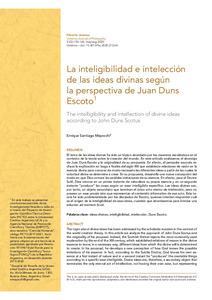Por favor, use este identificador para citar o enlazar este ítem:
https://repositorio.uca.edu.ar/handle/123456789/15777| Título: | La inteligibilidad e intelección de las ideas divinas según la perspectiva de Juan Duns Escoto The intelligibility and intellection of divine ideas according to John Duns Scotus |
Autor: | Mayocchi, Enrique Santiago | Palabras clave: | Duns Escoto, Juan, O.F.M., 1265-1308; INTELIGIBILIDAD; DIOS | Fecha de publicación: | 2020 | Editorial: | Universidad do Vale de Rio dos Sinos | Cita: | Mayocchi, E. S. La inteligibilidad e intelección de las ideas divinas según la perspectiva de Juan Duns Escoto [en línea]. Filosofia Unisinos. 2020, 21(2) doi:10.4013/fsu.2020.212.04 Disponible en: https://repositorio.uca.edu.ar/handle/123456789/15777 | Resumen: | Resumen: El tema de las ideas divinas ha sido un tópico abordado por los maestros escolásticos en el
contexto de la teoría sobre la creación del mundo. En este artículo analizamos el abordaje
de Juan Duns Escoto y la originalidad de su propuesta. En efecto, el pensador escocés rechaza
la explicación en boga a finales del siglo XIII que establecía relaciones de razón en la
esencia divina para conocer de modo necesario las diferentes ideas a partir de las cuales la
voluntad divina se determina a crear. En su propuesta, desarrolla una nueva concepción del
modo en que Dios conoce las posibles imitaciones de su esencia. En efecto, para el Doctor
Sutil, Dios conoce en un primer instante de naturaleza su propia esencia y en un segundo
instante “produce” las cosas según un esse intelligibile específico. Las ideas divinas son,
por tanto, un objeto secundario que terminan el único acto eterno de intelección, pero no
poseen un esse propio sino que representan el contenido informativo de ese acto. Esta teoría
ha sido problematizada por los discípulos de Escoto, quienes intentan responder cuál
es el origen de la inteligibilidad de esas ideas, cuestión que abordaremos para brindar una
solución ad mentem Scoti. Abstract: The topic about divine ideas has been addressed by the scholastic masters in the context of the world creation theory. In this article we analyze the approach of John Duns Scotus and the originality of his proposal. Indeed, the Scottish thinker rejects the most commonly used explanation by the end of the XIII century, which established relations of reason in the divine essence to know, in a necessary way, different ideas from which the divine will is determined to create. In his proposal, he develops a new perception of how God knows the possible imitations of his essence. In fact, according to the Subtle Doctor, God knows his own essence at a first instant of nature and in a second instant he “produces” the creatable things according to a specific esse intelligibile. Divine ideas are, therefore, a secondary object that terminates the only eternal act of intellection, not having their own esse, but representing sethe information content of the act. This theory has been discussed by the disciples of Scotus, who try to find out what is the origin of the intelligibility of those ideas. We will address these issue to provide a solution ad mentem Scoti. |
URI: | https://repositorio.uca.edu.ar/handle/123456789/15777 | ISSN: | 1984-8234 | Disciplina: | FILOSOFIA | DOI: | https://doi.org/10.4013/fsu.2020.212.04 | Derechos: | Acceso Abierto | Fuente: | Filosofia Unisinos. 2020, 21(2) |
| Aparece en las colecciones: | Artículos |
Ficheros en este ítem:
| Fichero | Descripción | Tamaño | Formato | |
|---|---|---|---|---|
| inteligibilidad-inteleccion-ideas.pdf | 598,53 kB | Adobe PDF |  Visualizar/Abrir |
Visualizaciones de página(s)
76
comprobado en 27-abr-2024
Descarga(s)
61
comprobado en 27-abr-2024
Google ScholarTM
Ver en Google Scholar
Altmetric
Altmetric
Este ítem está sujeto a una Licencia Creative Commons

